Can ducks eat pumpkins? While it might seem like a silly question, it’s a valid one. Yes, ducks can benefit from eating pumpkins. Pumpkins are chock-full of nutrients like fiber, potassium, and vitamin A, all of which can help keep your feathered friend healthy and happy.
Before you start throwing your leftover pumpkins into the duck pen, there are a few things to keep in mind. While ducks can eat pumpkins, there are some potential risks involved that you will need to be aware of.
So, can ducks eat pumpkins? The answer is yes – but only in moderation. Here’s a closer look at why pumpkins are good for ducks and how to incorporate them into your duck’s diet.
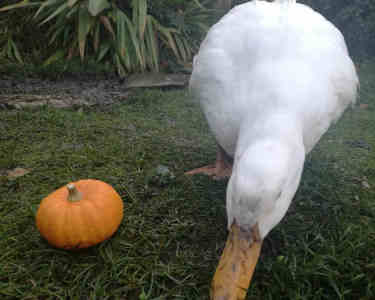
Can ducks eat pumpkins?
Pumpkins are packed with nutrients that can be beneficial for ducks, including vitamins A and C and fiber. However, pumpkins are also high in sugar. Therefore, you should only feed them to ducks in moderation.
One or two pieces of pumpkin per duck per day is plenty. Any more than that can lead to health problems like obesity and diabetes.
In addition to feeding pumpkins to ducks in moderation, it’s also essential to ensure that the pumpkin is correctly prepared before giving it to them.
Raw pumpkin can be hard for ducks to digest, so it’s best to cook it first. Steamed or boiled pumpkin is easy for them to eat and digest, and it helps them get all of the nutrients they need.
[DuckAffiliate]
The benefits of eating pumpkin for ducks
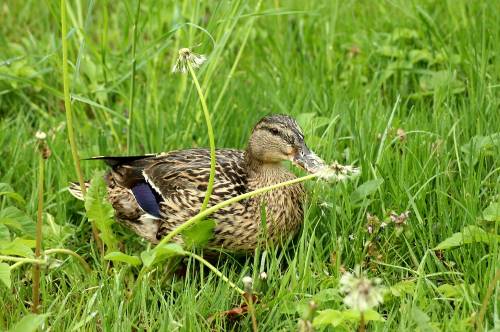
Here are a few reasons why you should consider feeding your ducks pumpkin.
Good source of vitamin A
Ducks need Vitamin A for proper growth and development, and pumpkins are a great source of this vital vitamin. Pumpkins also contain other vitamins and minerals essential for duck health, such as Vitamins C and E and potassium.
Can help with weight control
Like most animals, ducks can gain weight if they eat too much or don’t get enough exercise. Pumpkins can be a part of a healthy diet for ducks because they are low in calories and fat but high in fiber.
Fiber helps promote feelings of fullness after eating, so feeding your duck a pumpkin could help them eat less overall and maintain a healthy weight.
Provide essential nutrients during the molting season
Molting is a process whereby ducks shed their old feathers and grow new ones. This process requires a lot of energy and nutrients, which ducks can get from eating pumpkins.
Pumpkins are exceptionally high in carotenoids, which give feathers their orange color and help with feather growth. So, if you see some ducks looking a little scruffy during molting season, give them a boost with some pumpkin!
Keep digestive systems running smoothly
Like all animals, Ducks need fiber in their diets to help keep their digestive systems running smoothly. Fiber helps push food through the digestive system and can also help prevent constipation.
Pumpkins are an excellent source of fiber, so feeding your duck some pumpkins could help keep its digestive system healthy and functioning correctly.
Pumpkins can be used as an enrichment
Enrichment is anything that provides mental stimulation or physical activity for ducks and limits their exposure to boredom. Feeding your duck small pieces of pumpkin flesh or leaving a whole pumpkin out for them to explore are great ways to enrich their lives.
Studies have shown that enrichment can improve the overall health and well-being of ducks, so it’s something every duck owner should consider offering their feathered friend.
Things to watch out for when feeding pumpkins to ducks
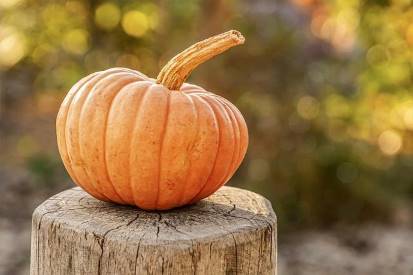
Pumpkins are a popular treat for ducks, but there are a few things you need to watch out for when feeding them to your feathered friends. Here are some tips to keep in mind.
Seed count
Pumpkins can be a good source of protein and essential nutrients for ducks, but they also contain a lot of seeds. While ducks can safely eat pumpkin seeds, too many can cause digestive issues. So, when feeding your duck pumpkin, remove the seeds first.
Pesticides
Organic pumpkins are always best, but if you can’t find them or they are too expensive, you can still feed your ducks regular pumpkins. Just make sure to wash them thoroughly first.
Pesticides can be harmful to ducks, so you want to ensure all pesticides are washed off before giving them the pumpkin. To wash a pumpkin, cut it open and scrub the inside and outside with water and a soft brush.
Nitrate levels
Pumpkins that are grown in nitrogen-rich soil can have high levels of nitrates. These nitrates can convert into harmful nitrites in a duck’s system and cause problems like anemia. To be safe, only feed your duck pumpkins that were grown organically.
Moldy pumpkins
Pumpkins can go bad surprisingly quickly, especially if stored in a warm place. Before feeding your pumpkin to your ducks, check it for mold. If there is any mold on the outside of the pumpkin, it’s best to throw it away.
Even if there doesn’t appear to be any mold on the outside, cut the pumpkin open and check the inside to be safe. If you see any mold inside the pumpkin, don’t feed it to your ducks.
You should never feed moldy pumpkins to ducks (or any other animals, for that matter). Mold can cause respiratory problems, infections, and GI distress in ducks. So, if you’re unsure whether a pumpkin is safe to feed your duck, err on the side of caution and throw it out.
Don’t overdo it
Pumpkin is a rich food; you should feed it in moderation like all rich foods. Overfeeding your duck can lead to obesity, putting unnecessary strain on its heart and lungs.
In addition, ducks who become obese are more likely to develop joint problems later in life. So, give your duck a small piece of pumpkin now and then, but don’t make it a regular part of its diet.
How often should ducks eat pumpkins?
As with most things, moderation is key when feeding ducks pumpkin. A good rule of thumb is giving them about 1/2 cup of pumpkin daily. This will ensure they get all the nutrients they need without overfeeding them.
Pumpkins should generally make up no more than 10% of your duck’s diet. The other 90% should consist of a variety of other fruits and vegetables and good quality duck food. Be sure to consult your veterinarian for specific recommendations for your duck’s diet.
How to prepare a pumpkin for feeding to ducks
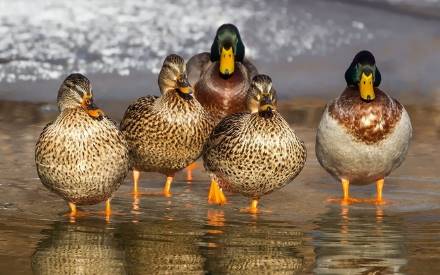
So how do you give your duck a taste of this tasty treat? One of the easiest ways is to offer them a small slice of pumpkin with their regular food. Start by cutting the pumpkin in half and removing the seeds (you can save these to roast later). Then cut the pumpkin into small pieces that your duck can easily eat.
You can offer the pumpkin raw or cook it before giving it to your duck. If you cook it, steaming or boiling are both excellent options.
You can also puree pumpkin and mix it into their feed or add it to their water bowl as an alternative to plain water.
No matter how you give it to them, rest assured that your duck will enjoy munching on some pumpkin just as much as they enjoy taking a dip in their pond.
Can baby ducks eat pumpkins?
As it turns out, the answer is yes! Baby ducks can safely eat pumpkins. Many experts recommend feeding pumpkins to baby ducks as a way to help them with digestive issues.
Pumpkin is packed with fiber and nutrients that can help keep a baby duck’s digestive system running smoothly. Just cut the pumpkin into small pieces so the duck can easily eat it.
When feeding pumpkins to baby ducks, it’s important to remember that they need a well-balanced diet just like humans do. Just like we wouldn’t want to live on a diet of pure pumpkin pie, neither do ducks.
Offer them various foods, including fresh fruits and vegetables, insects, and commercial duck feed. And if you do decide to give them some pumpkin, make sure it’s raw or cooked (never canned), and cut it into small pieces so they can easily eat it.
What other vegetables can ducks eat?
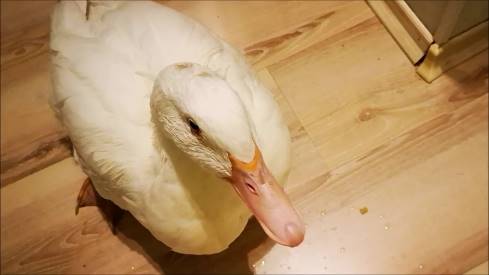
We’ve established that ducks love eating pumpkins. But what other vegetables can they eat? As it turns out, there are quite a few! Here are just a few of the many veggies ducks can enjoy.
Carrots
Carrots are a classic duck favorite. They are crunchy and sweet, making them the perfect snack for ducks of all ages. Carrots are also packed with nutrients, like Vitamin A, essential for good vision. So not only are carrots delicious, but they’re also good for your duck’s health.
Read More: Can Ducks Eat Carrots? 5 Fantastic Benefits
Cucumbers
Cucumbers are another excellent choice for ducks. They are full of water, so they help keep ducks hydrated on hot days. They are also low in calories, making them a healthy snack option. Plus, most ducks love the cool, refreshing taste of cucumbers.
Peas
Peas are another excellent option for duck food. They are full of fiber and protein, which are essential for ducks. Peas also contain vitamins and minerals that help keep ducks healthy. Best of all, they’re easy to eat, and most ducks love them.
Zucchini
Zucchini is an excellent source of Vitamin C and antioxidants. Ducks love the taste and texture of this vegetable.
Broccoli
Broccoli is full of vitamins and minerals, making it a healthy choice for your duck. Broccoli also contains sulforaphane, which has been shown to have cancer-preventing properties.
Cauliflower
Cauliflower is another nutrient-rich vegetable that is perfect for ducks. It contains fiber, vitamins, and minerals and is low in calories.
Sweet potato
Sweet potatoes are an excellent source of vitamins A and C and fiber. They’re also a great source of beta-carotene, converted to vitamin A in the body, and essential for maintaining good vision.
Spinach
Spinach is rich in vitamins A and K, as well as iron. It’s also a good fiber, folic acid, and chlorophyll source. Spinach is an excellent option if you’re looking for a leafy green vegetable to feed your duck.
How to give ducks a healthy and balanced diet
As lovely as ducks are, many people do not realize how much care and attention they need to stay healthy and happy. One of the most critical aspects of duck care is feeding them a healthy and balanced diet.
One of the essential things to remember when feeding ducks is that they require a diet high in protein. Feeding them mealworms, insects, or even cooked meats is a good way to ensure that they are getting enough protein.
Along with protein, ducks also need essential vitamins and minerals in their diet, such as vitamin A, niacin, riboflavin, calcium, and phosphorus. A good way to give them these vitamins and minerals is by giving them greens such as lettuce or spinach.
Another thing to remember when feeding ducks is that they should always have access to fresh water. Not only do they use water for drinking, but they also like to use it for bathing.
Bathing helps ducks get rid of any dirt or parasites on their feathers. Changing the water regularly to stay clean and free of any contaminants is crucial.
Finally, it is important to monitor the food you give your ducks. Overfeeding them can lead to obesity, which can cause health problems such as heart disease or joint problems.
Can ducks eat pumpkin – final thoughts
Pumpkins aren’t just for humans – ducks love them too! Not only do they taste great, but they’re packed full of essential nutrients like fiber, potassium, and vitamin A.
Pumpkins can be a healthy treat for ducks – but only if they’re given in moderation and prepared adequately. Too many pumpkins can lead to health problems like obesity and diabetes. Cooked pumpkin is easy for ducks to eat and digest, and it helps them get all of the nutrients they need.
So next time you’re at the pumpkin patch, pick up an extra one (or two) for your feathered friends.
Related Articles:
